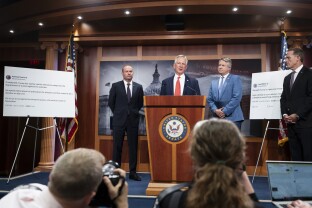Lawmakers across the aisle seem to be in agreement: Both presidential candidates need more security. They just aren’t all on the same page about what that should look like.
Speaker Mike Johnson plans to bring a bipartisan bill from Reps. Mike Lawler and Ritchie Torres to the floor of the House Friday, which calls for increasing Kamala Harris’ and Donald Trump’s security levels to the same as President Joe Biden’s.
In July, Biden already ordered the Secret Service to assign Harris and Trump the “highest levels of protection,” after the first assassination attempt against the Republican nominee, Acting Secret Service Director Ronald Rowe said this week; Trump had a full detail around him at his golf course in Florida when the Secret Service found a gun pointing at him in the bushes.
